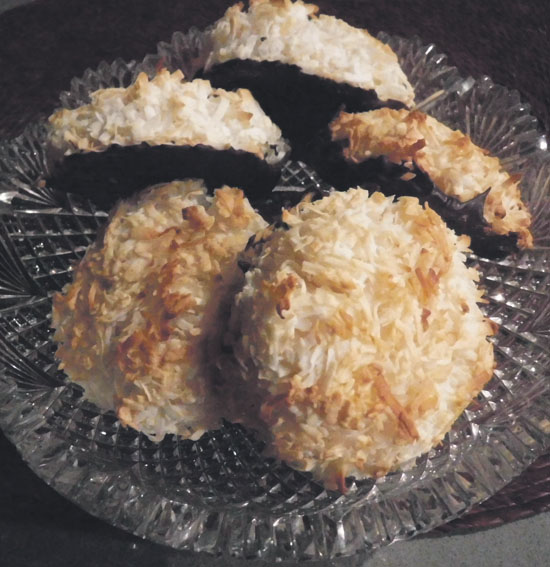|
|
Published April 6th, 2016
|
Coconut (and Chocolate) Lovers Can Dip into This Sweet, Seasonal Cookie
|
|
| By Susie Iventosch |
 |
| Chocolate-dipped Macaroons Photo Susie Iventosch |
Last issue we had some technical difficulties and the French chocolate "macarons" turned out to be "macaroons" in my column. Being a food columnist I was a bit alarmed, but because so many people really don't know the difference, and many of you may have always wondered, this gives us a great opportunity to spell out how these two types of cookies are made. Also, now I can share my neighbor Paula's amazing coconut macaroon recipe with all of you.
 Keep in mind, you absolutely must be a coconut lover in order to bother with macaroons, because they are mostly made of a big mound of coconut. If you can check that box, then please read on.
Keep in mind, you absolutely must be a coconut lover in order to bother with macaroons, because they are mostly made of a big mound of coconut. If you can check that box, then please read on.
 Both macarons and macaroons are made with stiffly beaten egg whites, and unless you desire a coconut filling in your macarons, that is pretty much where the similarities end. French macarons are very light and airy meringue cookie sandwiches, made with almond flour, flavoring and powdered sugar. The filling can be made from just about anything you desire, from jam or filling to buttercream or chocolate ganache. Just to add a little bit more complexity to the issue, there is also a type of cookie called an almond macaroon, which is typically made with almond flour or almond paste, and usually granulated
Both macarons and macaroons are made with stiffly beaten egg whites, and unless you desire a coconut filling in your macarons, that is pretty much where the similarities end. French macarons are very light and airy meringue cookie sandwiches, made with almond flour, flavoring and powdered sugar. The filling can be made from just about anything you desire, from jam or filling to buttercream or chocolate ganache. Just to add a little bit more complexity to the issue, there is also a type of cookie called an almond macaroon, which is typically made with almond flour or almond paste, and usually granulated
 sugar in place of the powdered sugar used in macarons. We are not going to focus on the almond macaroon this week, but perhaps another time ... they are really delicious, too.
sugar in place of the powdered sugar used in macarons. We are not going to focus on the almond macaroon this week, but perhaps another time ... they are really delicious, too.
 Macaroons, on the other hand, are made with coconut, sweetened-condensed milk, vanilla and a dash of salt ... that's it, unless of course, you dip the bottom in melted dark chocolate for an added touch of amazing flavor. This concoction ends up tasting like an over-the-top Mounds Bar. In my opinion, coconut and chocolate are a heavenly match, even though coconut with pineapple or lime are also delightful and can be added to your macaroon, if you so desire.
Macaroons, on the other hand, are made with coconut, sweetened-condensed milk, vanilla and a dash of salt ... that's it, unless of course, you dip the bottom in melted dark chocolate for an added touch of amazing flavor. This concoction ends up tasting like an over-the-top Mounds Bar. In my opinion, coconut and chocolate are a heavenly match, even though coconut with pineapple or lime are also delightful and can be added to your macaroon, if you so desire.
 This recipe calls for using both sweetened and unsweetened coconut, and Paula uses the flaked coconut as opposed to the shredded coconut. Trader Joe's packages this type of flaked, unsweetened coconut and I also found a private label brand at the grocery store where I shop. I have made macaroons that used the "Let's Do Organic" brand natural flaked coconut, and they were tasty, but not quite the texture I prefer in a macaroon, because the pieces of coconut are so tiny and a bit grainy.
This recipe calls for using both sweetened and unsweetened coconut, and Paula uses the flaked coconut as opposed to the shredded coconut. Trader Joe's packages this type of flaked, unsweetened coconut and I also found a private label brand at the grocery store where I shop. I have made macaroons that used the "Let's Do Organic" brand natural flaked coconut, and they were tasty, but not quite the texture I prefer in a macaroon, because the pieces of coconut are so tiny and a bit grainy.
 With a newfound knowledge of macarons and macaroons, you can venture forth and give each a try to see which type of cookie you prefer. Both of these recipes make excellent choices for Passover desserts, since they use no flour or leavening agent.
With a newfound knowledge of macarons and macaroons, you can venture forth and give each a try to see which type of cookie you prefer. Both of these recipes make excellent choices for Passover desserts, since they use no flour or leavening agent.


|
| Paula's Chocolate-dipped Coconut Macaroons |
(Makes 24 cookies)
 INGREDIENTS INGREDIENTS
 14-ounces sweetened, flaked coconut (approximately 4 1/3 cups) 14-ounces sweetened, flaked coconut (approximately 4 1/3 cups)
 12 ounces unsweetened, flaked coconut (approximately 4 cups) 12 ounces unsweetened, flaked coconut (approximately 4 cups)
 One 14-ounce can sweetened, condensed milk One 14-ounce can sweetened, condensed milk
 2 teaspoons vanilla 2 teaspoons vanilla
 4 egg whites 4 egg whites
 1/2 teaspoon salt 1/2 teaspoon salt
 6-8 ounces bittersweet or dark chocolate, melted in the microwave 6-8 ounces bittersweet or dark chocolate, melted in the microwave

 Directions: Directions:
 Line two baking sheets with parchment paper. Preheat oven to 325 degrees. Line two baking sheets with parchment paper. Preheat oven to 325 degrees.
 Mix the first four ingredients together in a large bowl until well integrated. It may seem too dry, but it will all work out. Mix together with a spoon until well mixed. Mix the first four ingredients together in a large bowl until well integrated. It may seem too dry, but it will all work out. Mix together with a spoon until well mixed.
 In a separate large glass bowl, beat egg whites with salt on high speed until stiff peaks form. In a separate large glass bowl, beat egg whites with salt on high speed until stiff peaks form.
 Fold coconut mixture into egg whites in three batches until all mixed together. Fold coconut mixture into egg whites in three batches until all mixed together.
 Using a one-fourth or cup rounded measuring cup, spoon batter onto parchment paper. Using a one-fourth or cup rounded measuring cup, spoon batter onto parchment paper.
 Bake for 22-25 minutes, until bottom of cookie is golden brown and tops are toasted. Remove from oven and cool completely. Bake for 22-25 minutes, until bottom of cookie is golden brown and tops are toasted. Remove from oven and cool completely.
 When cookies are at room temp, melt chocolate in the microwave until just melted. Dip the bottoms on the cookies in the melted chocolate, or spread chocolate on bottoms with a butter knife. Cool, chocolate side up, until chocolate is hardened. Store in an airtight container until ready to use. When cookies are at room temp, melt chocolate in the microwave until just melted. Dip the bottoms on the cookies in the melted chocolate, or spread chocolate on bottoms with a butter knife. Cool, chocolate side up, until chocolate is hardened. Store in an airtight container until ready to use.
|
|
|
|
|
|
|
|
| |
|
|
|
|



